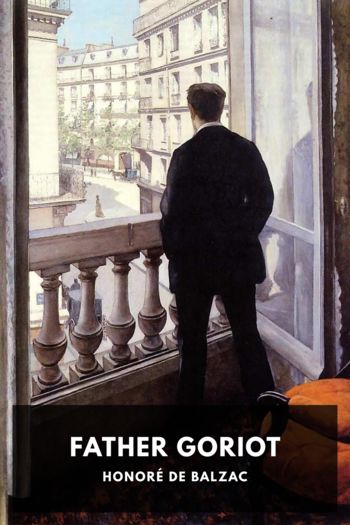Father Goriot - Honoré de Balzac (fantasy novels to read .txt) 📗

- Author: Honoré de Balzac
Book online «Father Goriot - Honoré de Balzac (fantasy novels to read .txt) 📗». Author Honoré de Balzac
The keen, bright blue eyes had grown dull, and faded to a steel-gray color; the red inflamed rims looked as though they had shed tears of blood. He excited feelings of repulsion in some, and of pity in others. The young medical students who came to the house noticed the drooping of his lower lip and the conformation of the facial angle; and, after teasing him for some time to no purpose, they declared that cretinism was setting in.
One evening after dinner Mme. Vauquer said half banteringly to him, “So those daughters of yours don’t come to see you any more, eh?” meaning to imply her doubts as to his paternity; but Father Goriot shrank as if his hostess had touched him with a sword-point.
“They come sometimes,” he said in a tremulous voice.
“Aha! you still see them sometimes?” cried the students. “Bravo, Father Goriot!”
The old man scarcely seemed to hear the witticisms at his expense that followed on the words; he had relapsed into the dreamy state of mind that these superficial observers took for senile torpor, due to his lack of intelligence. If they had only known, they might have been deeply interested by the problem of his condition; but few problems were more obscure. It was easy, of course, to find out whether Goriot had really been a vermicelli manufacturer; the amount of his fortune was readily discoverable; but the old people, who were most inquisitive as to his concerns, never went beyond the limits of the Quarter, and lived in the lodging-house much as oysters cling to a rock. As for the rest, the current of life in Paris daily awaited them, and swept them away with it; so soon as they left the Rue Neuve-Sainte-Geneviève, they forgot the existence of the old man, their butt at dinner. For those narrow souls, or for careless youth, the misery in Father Goriot’s withered face and its dull apathy were quite incompatible with wealth or any sort of intelligence. As for the creatures whom he called his daughters, all Mme. Vauquer’s boarders were of her opinion. With the faculty for severe logic sedulously cultivated by elderly women during long evenings of gossip till they can always find an hypothesis to fit all circumstances, she was wont to reason thus:
“If Father Goriot had daughters of his own as rich as those ladies who came here seemed to be, he would not be lodging in my house, on the third floor, at forty-five francs a month; and he would not go about dressed like a poor man.”
No objection could be raised to these inferences. So by the end of the month of November 1819, at the time when the curtain rises on this drama, everyone in the house had come to have a very decided opinion as to the poor old man. He had never had either wife or daughter; excesses had reduced him to this sluggish condition; he was a sort of human mollusk who should be classed among the capulidae, so said one of the dinner contingent, an employee at the Museum, who had a pretty wit of his own. Poiret was an eagle, a gentleman, compared with Goriot. Poiret would join the talk, argue, answer when he was spoken to; as a matter of fact, his talk, arguments, and responses contributed nothing to the conversation, for Poiret had a habit of repeating what the others said in different words; still, he did join in the talk; he was alive, and seemed capable of feeling; while Father Goriot (to quote the Museum official again) was invariably at zero degrees—Réaumur.
Eugène de Rastignac had just returned to Paris in a state of mind not unknown to young men who are conscious of unusual powers, and to those whose faculties are so stimulated by a difficult position, that for the time being they rise above the ordinary level.
Rastignac’s first year of study for the





Comments (0)